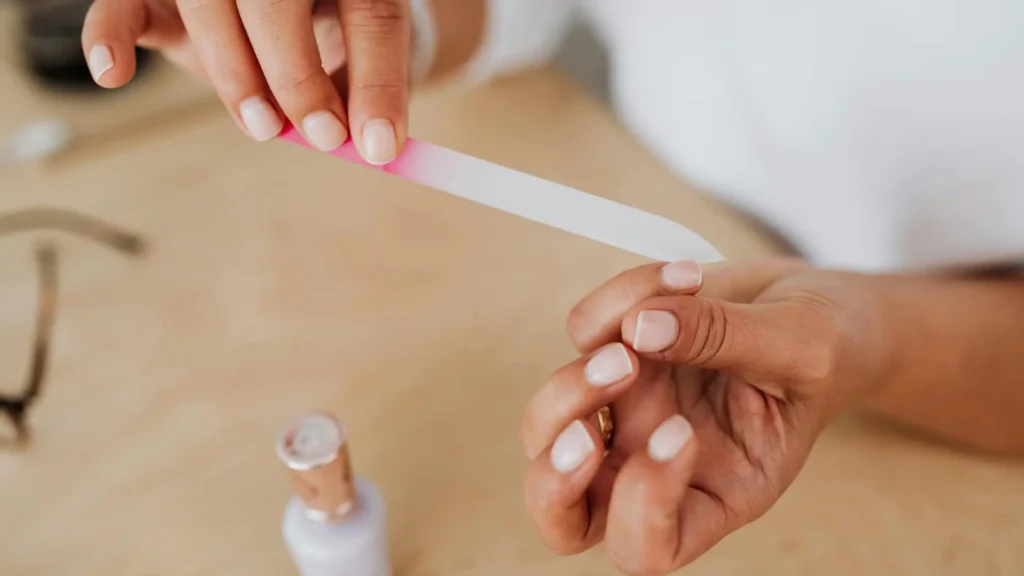Your nails, like your skin, are highly susceptible to damage from prolonged exposure to harsh chemicals found in common household products, such as cleaning agents, dish soap, and nail polish removers.
Repeated exposure to these chemicals can weaken the nails, making them more brittle, prone to breakage, and even discolored. Household cleaning products—which often contain aggressive chemicals like bleach, ammonia, and alcohol—can strip the nails of their natural oils, leading to dehydration and increasing their susceptibility to splitting and cracking.
Similarly, dishwashing involves frequent contact with soap and water, which can dry out the nail plate and surrounding cuticles, making nails more fragile over time.
Take Precautions When Exposed to Chemicals
To safeguard the health of your nails, it’s essential to take precautions when using chemicals or engaging in tasks that expose your nails to potential damage.
One of the simplest and most effective strategies is to wear gloves whenever you’re handling cleaning products, doing dishes, or engaging in other activities that may subject your nails to prolonged moisture or chemicals.
Wearing rubber gloves or dishwashing gloves acts as a protective barrier, shielding your nails and cuticles from direct contact with damaging substances. This can help preserve both the health of your nails and the moisture balance of the surrounding skin.
Select Nail Polish Remover Wisely
Nail polish removers, especially those containing acetone, can be particularly harsh. Acetone is a powerful solvent used to break down nail polish, but it can also dissolve the natural oils present in the nail plate, leading to dehydration, brittleness, and even thinning of the nails if used too often.
For this reason, it’s best to opt for acetone-free nail polish removers, which are gentler and typically contain moisturizing agents such as aloe vera, vitamin E, or glycerin. These formulations help to preserve the integrity of the nail while still effectively removing polish. Non-acetone removers are available in most drugstores, and they can significantly reduce the drying effects on your nails.
Another important consideration when using nail polish removers is to avoid excessive use. Constantly removing and reapplying polish can wear down the nail’s natural protection and increase the risk of nail damage.
Give Your Nail A Break
If you’re someone who regularly uses nail polish, consider giving your nails a break between manicures to allow them to breathe and recover.
Nail health experts recommend using a nourishing cuticle oil or nail serum after removing nail polish to replenish moisture and help restore the nail’s strength. These products often contain ingredients like keratin, biotin, and vitamin E, which provide much-needed nourishment and promote healthy nail growth.
Stop Using Soap For Long Time
It’s not just the chemicals themselves that can cause damage, but the prolonged exposure to water and soap, which can weaken the nail’s structure.
For example, frequent hand washing and long baths can leave nails soft and prone to bending or breaking. After washing your hands or being exposed to water, it’s a good idea to moisturize your nails and cuticles to lock in hydration and protect them from becoming too brittle.
Your Nails is Not A Machine
To further protect your nails, try to avoid using your nails as tools—whether for opening cans, picking at labels, or even typing with excessive force. These actions can exert pressure on the nails, causing stress fractures or peeling, especially if your nails are already weakened from exposure to chemicals.
Use Nail Strengtheners
Nail health professionals also advise using nail strengtheners or protective coatings (such as base coats with added fortifying ingredients) to provide an extra layer of protection against harmful chemicals. These treatments help shield your nails from external factors like cleaning agents and prevent them from becoming brittle or damaged.
By taking these steps to protect your nails from harsh chemicals and environmental factors, you can help maintain their strength, flexibility, and overall health. Just like skin, your nails are a reflection of how well they are cared for, and simple protective measures can go a long way in ensuring they remain strong and beautiful.
According to research from the American Journal of Dermatology, frequent exposure to chemicals can cause nails to become thin and brittle over time. Protecting nails from such exposure is crucial for maintaining their health.




